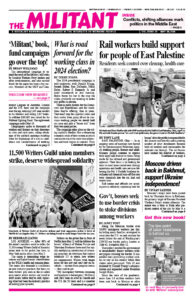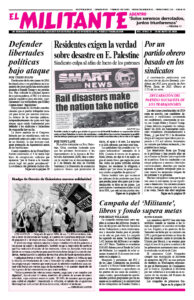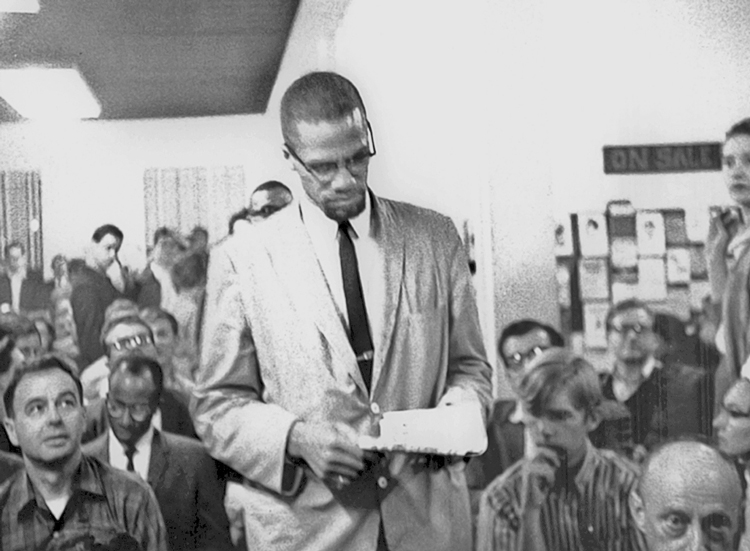On the 98th anniversary of his birthday this month, the Militant is featuring a selection from Malcolm X, Black Liberation, and the Road to Workers Power by Jack Barnes, national secretary of the Socialist Workers Party. Barnes said that “Malcolm X was a revolutionary leader of the working class in the United States.” The excerpt is from “He spoke the truth to our generation of revolutionists.” Barnes’ speech was a tribute to Malcolm two weeks after his assassination in Harlem Feb. 21, 1965. Copyright © 2009 by Pathfinder Press. Reprinted by permission.
Malcolm was the leader of the struggle for Black liberation. He was, as stated at his funeral by Ossie Davis, our Black shining prince, the manhood of the Harlems of the world. To his people he first and foremost belongs.
But he was also the teacher, inspirer, and leader of a much smaller group, the revolutionary socialist youth in America. He was to us the face and the authentic voice of the forces of the coming American revolution. He spoke the truth to our generation of revolutionists.
What attracted revolutionary youth worldwide to Malcolm X? More important, what often made youth who listened to him — including youth who are not Black — start down the road to becoming revolutionists? … [H]e spoke the simple truth — unadorned, unvarnished, and uncompromising. …
Malcolm asked the Black American: Who taught you to hate yourself? Does he hate himself? Who taught you to be a pacifist? Was he a pacifist? Who said Black people cannot defend themselves? Does he defend himself? Who taught you not to go too far and too fast in your fight for freedom? Did he stand to lose something by the speed of your victory? Who taught you to vote for the fox in order to escape from the wolf? What does the fox give you in return? …
Though Malcolm X came from the American ghetto, spoke for the American ghetto, and directed his message to the American ghetto first of all, he became a figure of world importance, and developed his ideas in relation to the great events of world history in his time.
If Malcolm X is to be compared with any international figure, the most striking parallel is with Fidel Castro. Both of them belong to the generation that was shaped ideologically under the twin circumstances of World War II and the monstrous betrayals and defaults of Stalinized Communist parties. These men found their way independently to the revolutionary struggle, bypassing both Social Democracy and Stalinism.
Each started from the struggle of his own oppressed and exploited people for liberation. Each embraced the nationalism of his people as necessary to mobilize them to struggle for their freedom. Each stressed the importance of the solidarity of the oppressed all over the world in their struggle against a common oppressor.
Fidel did not start out as a thoroughgoing Marxist or as a revolutionary socialist. Like Malcolm, he was determined to pursue the national liberation of his people by “whatever means necessary” and without any compromises with those with any stake in the status quo.
Fidel Castro’s dedication to political independence and to economic development for Cuba led him to opposition to capitalism. So, also, Malcolm’s uncompromising stand against racism brought him to identify with the revolutions of the colonial people who were turning against capitalism, and finally to conclude that the elimination of capitalism in this country was necessary for freedom. Just as Fidel Castro discovered that there can be no political independence and economic development in a colonial country without breaking from capitalism, so Malcolm had come to the conclusion that capitalism and racism were so entangled in the United States that you had to uproot the system in order to eliminate racism.
Malcolm’s Black nationalism was aimed at preparing Black people to struggle for their freedom. “The greatest mistake of the movement,” he said in an interview in the February 25 Village Voice, “has been trying to organize a sleeping people around specific goals. You have to wake the people up first, then you’ll get action.”
“Wake them up to their exploitation?” the interviewer asked. “No, to their humanity, to their own worth, and to their heritage,” he answered.
Everything he said to Black people was designed to raise their confidence, to organize them independently of those who oppressed them, to teach them who was responsible for their condition and who their allies were. He explained that they were part of the great majority — the nonwhites and the oppressed of the world. He taught that freedom could be won only by fighting for it; it has never been given to anyone. He explained that it could be won only by making a real revolution that uproots and changes the entire society.
Thus it is not surprising that many who considered themselves socialists, radicals, and even Marxists could not recognize and identify with Malcolm’s revolutionary character. They could not recognize the revolutionary content of this great leader clothed in the forms, language, and dark colors of the American proletarian ghetto.
Even with all his uniqueness and greatness as an individual, he could not have reached this understanding unless the conditions in this country were such that it was possible. Even though no one can fill his shoes, the fact that he did what he did, developed as the revolutionary leader he was, is the proof of more Malcolms to come.
He was a proof as Fidel is a proof. Fidel stood up ninety miles away from the most powerful imperialism in the world and thumbed his nose and showed us, “See, it can be done. They can’t go on controlling the world forever.”
Malcolm went even further than Fidel, because Malcolm challenged American capitalism from right inside. He was the living proof for our generation of revolutionists that it can and will happen here.


